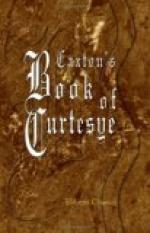P) Loo, my child, this faders avncyente
Repen the fyldes ffresshe
of fulsomnes; 401
the flowres fresshe thei gadered
vp, & hente.
Off syluer langage the
greate ryches
who will[e] yt haue, my child, dowtles
404
Muste of the_m_ bege:
ther_e_ ys no more to saye,
ffor of owr_e_ tonge thei
were both loke & keye;
P) Ther ca_n_ no ma_n_ ther werkes dysteyne:
The enbamed tonge & avreat
sentence, 408
Me_n_ gete yt now by ca_n_telmele, & glene
here & ther_e_ by besy delygence,
& fayne wold reche ther
crafte of eloqvence;
& by the
gleyne ytt ys full[e] ofte sene 412
In whose fylde
the gleners haue bene.
CAXTON’S TEXT.
[57]
But his werkis / his laude / must nede co_n_q_ue_re
[Sidenote: His works]
They may neuer / out of remembraunce dye
His werkis shal [=h]is name conueye & bere
395
Aboute the world_e_ / almost eternely
[Sidenote: shall bear his name about the world
almost eternally.]
Lete his owe_n_ werkis preyse hym & magnefie
I dar not preyse / for fere lest I offende
My la_n_gage / shold rather apeyre than amende
399
[58]
[Sidenote: Leaf 10 b.]
Loo my child_e_ / these faders auncyente
Repen the feldes fresshe of fulsomnes
[Sidenote: These fathers reaped the fields,]
The flours fresh they gadred vp & hente
402
[Sidenote: and gathered the flowers.]
Of siluer langage / the grete riches
Who wil it haue my lityl childe doutles
Muste of hem begge / ther is no more to saye
[Sidenote: He who wants silver words must beg
of them.]
For of our tunge / they were both lok & kaye
406
[59]
Ther can noma[=n] now her werkis disteyne
The enbamed tunge / and aureate sentence
Men gete it now / by cantelmele & gleyne
409
[Sidenote: Now we only glean,]
Here and there by besy diligence
And fayne wold reche / her craft of eloque_n_ce
And by the gleyne / it is ful oft sene
In whos felde / the gleyners haue bene
413
[Sidenote: and by the gleaning one sees in whose
fields the
gleaners have been.]
* * * * *
THE ORIEL TEXT.
[60]
As vnto me Age hath bede good morowe,
I am not able clenly for to gleyne,
Nature is feyne of crafte here eien to borowe,
416
Me fayleth clerenesse of myn eien tweyne;
Begge I may, I can no gleyn certeyn,
Ther-for that werke I wolle
playnly remytte
To folke yong, more p_er_saunt
clere of wytte. 420




